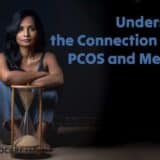The Ultimate Guide to Premenstrual Syndrome (PMS): Causes, Symptoms, Diagnosis, Treatments and Tips
Premenstrual syndrome (PMS) is a common occurrence among women, causing various physical and emotional changes during their menstrual cycle. While most women experience mild symptoms that fade with menstruation, others suffer from a severe condition called premenstrual dysphoric disorder (PMDD). In this comprehensive guide, we will explore PMS, including its causes, symptoms, diagnosis, treatment options, and tips for managing the condition.
Understanding Premenstrual Syndrome (PMS)
PMS involves a combination of physical, emotional, and behavioral symptoms that occur after ovulation and last until menstruation. These symptoms can affect mood, emotions, physical health, and behavior, causing discomfort and disruption in daily life.
Differentiating PMS and PMDD
It is important to differentiate between PMS and PMDD. PMS refers to the range of symptoms experienced before a woman’s period, affecting emotional well-being and physical state. PMDD is a more severe form of PMS, characterized by intense emotional and physical symptoms that significantly interfere with daily functioning.
Premenstrual Exacerbation (PME): Understanding the Connection
PME is closely related to PMS, where existing mental health conditions such as anxiety or depression worsen during the premenstrual phase. Women with underlying mental health disorders may experience heightened symptoms during this time. Recognizing the connection between PMS and PME is crucial for developing effective treatment approaches.
Causes of PMS: Unraveling the Mysteries
While the exact causes of PMS are not fully understood, hormonal fluctuations play a significant role. Changes in estrogen and progesterone levels trigger PMS symptoms, impacting the delicate balance of neurotransmitters in the brain. Lifestyle factors such as stress, poor nutrition, lack of exercise, and inadequate sleep can also contribute to the severity of PMS symptoms.
Recognizing PMS Symptoms
PMS symptoms vary but commonly include mood swings, bloating, breast tenderness, food cravings, fatigue, irritability, anxiety, depression, and difficulty concentrating. These symptoms typically appear one to two weeks before the menstrual period and follow a predictable pattern. It is important to note that symptom severity can vary, and some women may experience more severe symptoms, indicating PMDD.
Diagnosing PMS: Seeking Clarity
Diagnosing PMS involves a thorough evaluation of symptoms, medical history, and menstrual cycle patterns. Keeping a symptom diary can provide valuable insights into symptom onset, duration, and intensity. Healthcare professionals may conduct physical exams and specific tests to rule out other medical conditions that may mimic PMS symptoms. Accurate diagnosis is crucial for developing a personalized treatment plan.
Treatment Options: Regaining Control
Various treatment options are available to alleviate the symptoms of PMS and improve overall well-being. Lifestyle modifications, such as regular exercise, stress management techniques, a balanced diet, and sufficient rest, can help reduce symptom severity. Healthcare providers may prescribe medications like nonsteroidal anti-inflammatory drugs (NSAIDs), hormonal contraceptives, and selective serotonin reuptake inhibitors (SSRIs) based on individual needs. Complementary therapies, including acupuncture, herbal supplements, and cognitive-behavioral therapy (CBT), can also provide additional support.
Tips for Managing PMS
In addition to medical treatments, self-care practices can help manage PMS symptoms. Engaging in regular physical activity, practicing relaxation techniques like meditation or deep breathing exercises, maintaining a healthy diet rich in whole foods, getting enough sleep, and seeking emotional support from loved ones can all contribute to improved well-being during the premenstrual phase.
Hermones Help Alleviate PMS Symptoms
Hormonal imbalances play a significant role in the development of premenstrual syndrome (PMS) symptoms. Hermones, a natural nutraceutical supplement, offers relief from PMS by addressing hormonal imbalances that contribute to the condition.
By incorporating Hermones into a comprehensive PMS management plan, women can potentially experience reduced PMS symptoms and improved overall well-being.
Conclusion
Premenstrual syndrome (PMS) is a multifaceted condition that affects many women. By understanding its causes, recognizing symptoms, seeking proper diagnosis, exploring treatment options, and adopting self-care practices, women can regain control over their lives and find relief from the challenges posed by PMS. With the right knowledge, support, and strategies, women can navigate the ups and downs of their menstrual cycle with greater ease and empowerment. Understanding the hormonal imbalances that contribute to PMS and utilizing approaches like Hermones, a natural supplement designed to address hormone-related issues, can provide relief and improve overall hormonal health.
Frequently Asked Questions (FAQs) About PMS
Q: What are the common symptoms of PMS?
A: Common symptoms of PMS include mood swings, bloating, breast tenderness, food cravings, fatigue, irritability, anxiety, depression, and difficulty concentrating.
Q: How long do PMS symptoms typically last?
A: PMS symptoms usually arise one to two weeks before the start of the menstrual period and subside with the onset of menstruation. The duration of symptoms may vary from woman to woman.
Q: Can PMS symptoms be relieved with lifestyle changes?
A: Yes, certain lifestyle changes can help alleviate PMS symptoms. Regular exercise, stress management techniques, a balanced diet, adequate sleep, and seeking emotional support can contribute to reducing symptom severity.
Q: When should I consult a healthcare professional about PMS?
A: It is advisable to consult a healthcare professional if your PMS symptoms significantly interfere with your daily life, cause excessive distress, or if you suspect you may have premenstrual dysphoric disorder (PMDD), a more severe form of PMS.
Q: Are there any treatments available for PMS?
A: Yes, various treatments are available for managing PMS. These can include lifestyle modifications, natural supplements like Hermones, medications like nonsteroidal anti-inflammatory drugs (NSAIDs) or hormonal contraceptives, and complementary therapies like acupuncture or cognitive-behavioral therapy (CBT).




